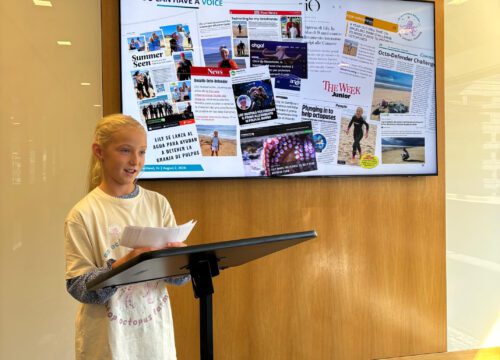Raising money and awareness for octopus protection since she was 10 years old.
Starting a Club
Starting a Club
A gathering like a club can be a great way to reach your goals by regularly bringing a team of committed people together to work towards a goal. One of the best reasons for starting or joining a club is because it allows you to do an activity you enjoy and inspire others to join you. This could be anything from cooking to gardening to debating in a model UN club.
Steps to starting a club

1. Choose the club’s purpose and goals.
Clubs can take many different forms and can host different activities. The beauty of starting your own club is that you get to choose exactly what the club will do and how it will do it. For example, the aim of the club might be to address inequality in your local community and you might choose to do that by sharing learnings with each other or you might focus on fundraising and making posters to put up around your community.

2. Decide who your club is for.
It’s always a good idea to make your club as inclusive as possible to help it grow quicker and get a wider range of viewpoints. But occasionally you might need to limit how many people can join so that the club can stay focused and appropriate – for example, because it might not be suitable for younger children. Sometimes it can be very useful to invite adults to join your club. If you are starting a club at school, you might like to invite a teacher, who can help communicate your message to the other teachers.

3. Set when your club will take place.
Think about who might attend your club and when they might be available. If your club is for other children, then perhaps the club could meet during your school lunch or as an after-school activity. Whereas it you’re hoping to interest adults to join, your club may need to take place on the weekends or before or after the work day.

4. Get any permissions needed.
Depending on who your club is for and where it takes place, you may need to get permission. To do that, you’ll need to share information about what you are doing – for example, to run a club at school, you’ll probably need to talk to your headteacher. It’s good to sound as organised as possible when you speak to them, so here are some ideas of things you might like to communicate:
- Tell them:
- What your club’s purpose and goals are
- What your club will be called
- When your club will take place
- Who might be interested in joining your club
- Ask them:
- Is there already a similar club?
- May we use your facilities?
- Is there a grown-up who shares a similar interest who might be happy to become the supervisor for the club?

5. Spread the word.
Once your club has been officially approved, spread the word to get people to sign up! You can do this by talking to your friends about it, making speeches in assemblies or putting posters up around the school.

6. Host your club.
It’s time to host your club’s first meeting! It’s great to make your club as fun and interesting as possible, with refreshments, speakers and activities! Remember to give everyone an equal opportunity to contribute and share their views.

REFLECT
Starting a club is not only a great way to make a difference but it’s also a great way to meet new people and bring people together.
Don’t forget to have a think about what went well, what you might have learnt for the future, and the impact of your actions.
For example, what was the impact of your club? Did you enjoy meeting new people? What were any challenges that you faced and how did you overcome them?
A club that Changed the world
People of all ages and backgrounds use clubs to bring people together to share skills and knowledge. One club that has been very successful is Model UN.
Model UN was started in November 1921. Nowadays, hundreds of thousands of students like you take part in Model UN.
Model UN clubs act out meetings that the UN may have, giving students real life experience in the decision-making processes of the UN. In these clubs, students research, debate and try to solve some of the world’s most important problems. For example, they might imitate the COP26 climate change conference, debating emissions targets as goals for different countries.
Model UN has been so good at teaching students the necessary skills to become leaders that many of today’s leaders in law, government, business and the arts took part in Model UN as students.
If you’d like to join a Model UN, search for one near you online. If you can’t find one, you could start your own! You can find information on how to start one here.

Change-Makers
Clubs can be a really good way to share your passion and excitement for something with others. Check out some change-makers who have used clubs to inspire more people to follow in their change-making footsteps:
Ali Waters Galán
Campaigning for people and businesses to stop using single-use plastics since they were 10 and 12 years old.
Sri Nihal Tammana
Campaigning to promote proper battery disposal and recycling since he was 10 years old.
Amy and Ella Meek
Campaigning for people and businesses to stop using single-use plastics since they were 10 and 12 years old.
Jakomba Jabbie
Inspiring girls to learn about and aspire to work in science and technology subjects since she was 16 years old.










